
Interview with Otto Kuche, a member of the German police and later Wehrmacht. Kuche was an outspoken Hitler critic, but was later won over when he saw the rebirth of Germany and its people through National Socialism. Fürth, 1983.
[Tante Inge translating/helping]
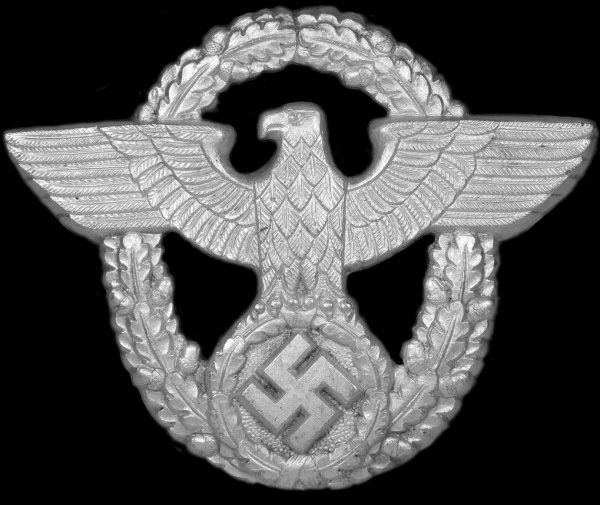
Thanks for letting us meet with you sir, I am wanting to ask you a few questions about the war if I can. First one is I understand you served in the police before the war?
Otto: There is far more to my story here, friends. Far more, you see, I started my young life as a teacher of literature and literary history. This was in 1932 and I will tell you I did not care for Hitler at first. For me he was a revolutionary who was opposed to the world I grew up in.
Sure, I saw the communists as a threat as well, but Hitler was here in Bavaria, and they were not. I remember I saw him as uneducated, hot-headed and threatening. I felt his attacks on this new democracy were unwarranted and dangerous. My father felt the same way as well but was a little more open to him.
You must be surprised considering you are here speaking to me with this company, I came to see him as correct later, even though I had gotten into trouble speaking against him. I went to the parish here in Fürth and the priest was a critic of the way the Nazis were attacking some ideas of the Church. He said that if Jesus were here, he would condemn Hitler and his stance.
By 1935 Hitler was in full control, had the constitution suspended, and the SA and SS were rounding up many who opposed the National Socialist party. I was in disbelief that a nation could allow these things. For me the ability to speak your mind and say what you thought was important to a healthy society.
I had a good class of students, and I asked them to do a paper on the effects of stifling freedoms, especially the freedom to express oneself in conversations. This was banned as well, you could not utter anything seen as against the party, or Hitler, sure, it was mainly the communists this was aimed at, but it also snagged others.
I remember in 1933-34 many people were arrested and taken away. A priest was arrested, trade union men were taken, and anyone who handed out papers stating that Hitler was a bad idea were sent away. I was not happy with this crackdown on our basic freedoms. I revolted as I could, by speaking to my students. I asked for this paper to be written and asked them to be honest.
They all wrote papers that were mostly in defense of the state's actions, which I was a little shocked by. I had a lecture where I told them that to take away a person's ability to speak freely is taking a part of their soul. I had many HJ [Hitler Youth] in class you see, and I should have paid heed to this.
One of them turned me into the headmaster and I was visited by the Gestapo who took the papers and asked me why I would make students do such a thing. Their argument was that emergency decrees were passed to prevent any counter-revolutions. I told them my reasoning and they left saying an investigation would be forthcoming. A week later I was called into the office and told I would no longer be teaching.
It was lucky for me that my family had a bit of connections and was able to get this incident buried. I was then able to work for my father and even though I was very bitter at what happened, I started to see that the warnings the anti-Hitler people gave out were not coming true. I also had started to pay attention to the Jews, whom I always looked at as sincere people who we should welcome.
Here is where I had my epiphany. By 1937 I was seeing a nation that had been transformed into a peaceful and very prosperous homeland. You see, let me continue, some people said Hitler would ruin Germany by taking us off the trade markets and gold standards. That his vow to make Germany self-sufficient would bring us to ruin worse than the depression.
These warnings all came from the same groups, Marxist-leaning people, and those who were capitalist-leaning. Hitler seemed to be taking the best in both ideas and putting them into one idea. There was nothing wrong with making your own money, you just could not take advantage of your people to do it. Charging inflated prices for goods and utilities was stopped. This brought costs down on everything.
My father's profits went up, taxes went down, he could employ more people, which helped the economy more. Today it is taught that the economy was in shambles and did not work. All I saw was people back to work, happy, and doing well, we may not have been filthy rich, but we were happy.
You will ask how I came to change my mind. It was simply the Jewish issue. I started to notice how all the parties wanted to curtail freedoms. Yes, even in the Weimar era they banned certain actions and speech. I never paid attention to this until Hitler came to power, but Jews had been behind the push to ban any criticism of themselves or their people. They do the very same today, or at least try to. This opened my eyes, you could say, that there was more to these people than just friendly faces.
I still was not sold entirely on Hitler as I was religious and felt the party had offended the Church, but that also was addressed in 1938. That was when I came to the police.

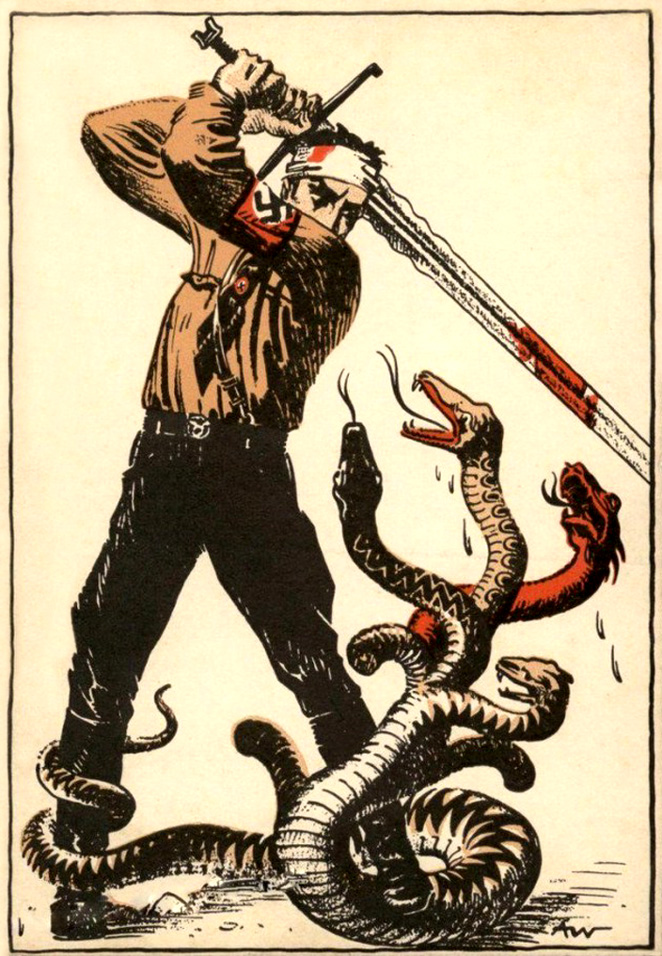
[Above: A National Socialist Brownshirt fighting the hydra. This mythical beast represented everything dark and vile. Note that he has already cut off some of the hydra's heads. We see one of the beast's heads is solid red, no doubt representing the communists which nearly took over Germany in the years before Adolf Hitler was appointed Chancellor.]
Can I ask you how you decided to become a police officer, that is an odd change from teacher to a policeman?
Otto: Oh yes, that is the truth is it not? A very strange twist of affairs for me. I was doing well in my father's business as a salesman and consultant, but I felt unfulfilled. I was still smarting from being dismissed from teaching as well. In my mind, going into state service was a way to get back into the people's society.
I knew a friend who was in the Nuremberg Police, and he introduced me to some friends. We got along famously, and I mentioned I would like to become one of them. Of course, father was livid and did not want me to do this, as I was useful to him, but I set my course. I was accepted for an interview and told them I had a history with the Gestapo, I was honest. They laughed and knocked on the door. I was shocked the same Gestapo man was here for my interview, they had called him in.
You see the police by then was fully part of Himmler's SS, how is that for a twist? I was asked first off why I think this matter should be overlooked. I stated that I had a change of heart. I now understood that the reason Hitler and the new party had these laws was to stop the enemies of Germany who had used the constitution as a tool of conquest. They stopped their usurping of power with the very laws they had tried to use on Hitler.
I must have been very convincing, and I will tell you why later, but they were impressed by my response, and I was granted probationary membership, pending schooling and certifications. I was very happy at this outcome you see, it put me back into good standing.
So, to become a police officer I felt like I could help society, to help those who were being victims of people's bad habits and bad manners. My beginnings were nothing fancy, I was more a file steward and would bring files to court trials or aid detectives in their investigations.
What I thought would be a very political police force, oppressing enemies, was in fact a force used to protect society from those who sought to cut in front of the line, or to defraud their people. I was glad I did this and never really looked back on it with anything but pride. We protected the people from those who sought to hurt them or to break their trust.
Now, before I forget, let me tell you about the Church people. And so, part of my first duties was organizing the file room. This was where I really started to see the other side and became curious. I was able to see the actual crimes that people I thought were just nice innocent people were committing.
So, I always thought Hitler was anti-Church, at least the papers said so, I of course, resented this. As I was looking at one of the files, I saw a police file about a priest here that was forced out. It turned out he was embezzling money from the coffers.
He spoke out about Hitler, and this brought scrutiny, where it was uncovered that he was quite a wine collector and gambler, spending a lot of money on the lottery and such. There was also mention that he may be involved in other crimes that were linked to other areas and parishes, but what was found was enough to remove and arrest him.
That shattered my beliefs that Hitler was targeting the Church. I also saw the files on some prominent Jews in the area who we never saw after 1933. They fled or were sent to prison. There were files regarding child sex, illegal use of funds, extortion, arson, rape, murder, drugs, and those were the big ones.
That shattered my idea that Jews had been targeted solely on their faith. You see my family never paid attention. We had money, and the outside world really was a distant issue. I always thought of Jews as smart, intellectual, and friendly. I never saw any side of them that would suggest otherwise.
Seeing the inside workings of what their people were doing, and the fact they were always on the liberal side of politics enabling this behavior, either intentionally or unintentionally, got to me. I started to piece the puzzle together. I saw that [Julius] Streicher, whom at first, I thought a fool, was correct. The fact he was hung just for going after Jews is telling.
Goebbels wrote a book I recall, and in that book, he mentioned that they wear a mask. On face value they seem like the type of people any society would love to have. Smart, good business partners and upstanding citizens. They hide their true colors very well, and you will see them in all walks of life, however those who have been placed in power go out of their way to help bring other Jews in.
They created a very unfair advantage starting a couple hundred years ago. Asking for asylum, then bringing in more, pooling their money to buy power which gave them more power. It is interesting that they split into two types, those who enjoyed their money and power, and those who went to politics to dismantle it all. Very strange people, and some even helped us in the war, very strange indeed. That is my rant about the Jews and how they became so powerful here.
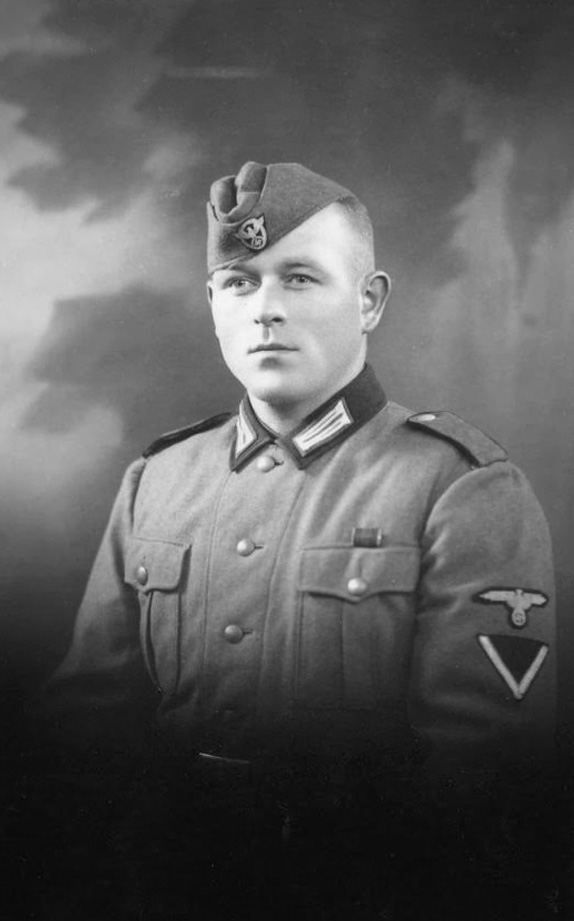
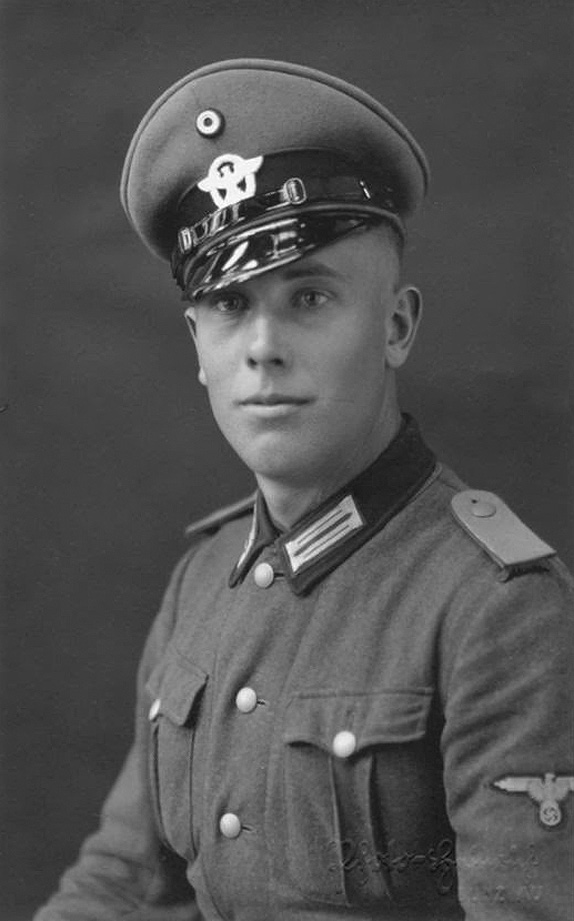
[Above: Two young police officers.]
I understand you were sent to Poland during the war, can I ask what it was like there?
Otto: Yes indeed, after the German victory in Poland, I was asked to volunteer from order police to security police. I was sent to help look for those who had murdered Germans, to be clear, illegal killings which are not spoken of today. Regarding the war, I was not opposed to going into Poland. My father spoke of the problems in the east, and how bastard nations like these were more a drain than a benefit. He reasoned that when under the control of a larger and stronger nation these nations were productive.
When they were given their own autonomy, they struggled both internally and with being peaceful to their neighbors. Take Poland, I knew from studying that when the Versailles dictate created the nation, one of their first acts was to attack Soviet Russia. In turn the reds attacked them and nearly overran the new nation.
Then they turned their attention to Germany and Romania, trying to take more areas that the dictate did not give them. This caused strife and bad feelings felt even today. I was not for war, but I knew we had border problems that usually only military action will settle. I was for that.
I saw files in Poland regarding the attacks on Germans who were forced to live under a new master after Versailles. These files were eyewitness statements, interrogations, and confessions of Poles who attacked Germans. I will state here that in some cases they were not even Poles, they were Czechs and Balkan aliens who had a hated of Germany.
On my first day in Poland, I was with an army soldier whose unit came through the area, he pointed out to me a German farming settlement where the homes were all burnt down. This was done by Polish mobs, and in some of these cases Germans were killed. That is what we investigated.
The arrests were made on fingerprints, eyewitnesses who saw the events, and statements from those who cooperated with us to find the guilty. Jews, believe it or not, aided us in tracking down Poles, as some Poles went crazy and attacked Jews, thinking they were pro-German. There was more of this elsewhere I will share later.
Many Jews in Germany came from the east, so that is why. There was a report I read from the army where a German unit had stopped a Polish mob from beating Jews. We also investigated with some military units, as there were cases of Polish civilians shooting German soldiers.
You name it, my office was assigned to investigate it, even crimes committed on Poles by Poles. We learned to speak some Polish and worked with reformed Polish police as well. This went on all through 1940 for me. I can tell you that the claims made by Hitler regarding the mistreatment of Germans in Poland is true. The numbers may be inflated a bit, I can not verify them, but Germans were killed.
I have read that the Jews and Poles were rounded up and sent to ghettos, camps, or prison. Some Germans have even said they saw this and are ashamed. Can you tell me anything about this?
Otto: This is an intelligent young one here. You likely will have issues if you ask these questions of Germans who were alive in this time. These are tough talks to have and painful for some as well. Some may not want to tell you the truth as they also may be afraid you will get them in trouble. So be aware of that. However, I will share with you my experiences and observations.
It is true in the sense that these things did happen, but in limited numbers. I will also tell you later in the war I was part of the labor allocation details that made sure people were working where they were needed. It was a necessary evil in wartime.
Poland needed to be brought into a modern era, and with German technology we made this happen. We had to make them help in this at times, we had to have them help themselves improve. The General Government formed a Polish version of the RAD (Reichsarbeitsdienst, Reich Labor
Service) and made it mandatory that the young, from 18-30 I believe, would serve 6 months.
This was meant to have them all work together as one to form a bond that only working together can do. Welfare was set up to help the poor to get on their feet or to make their life worry-free if they could not care for themselves.
They used the people who could work to build Poland into a more modern nation, with better roads, better waterways, and to replace destroyed natural resources. I saw them out working a few times and noted they seemed to be happy, not abused or anything like that. They had no guards, so they were not 'forced' laborers. Even the Jews had to serve, and I would hear them speaking their odd Yiddish, broken German which we could not hope to understand.
They had to be kept separate as the Poles refused to work with them, I remember. I saw nothing that would make us think this was wrong or cause them to suffer. We Germans looked at the Jews as a strange people. As I said, on one hand, they seemed nice and friendly, but in their midst were people who Hitler was warning about. I learned more about them after the war as I could see the power their people possessed.
They were the ones who pushed race pollution and immorality, they were the porn peddlers and pimps. Also coming from them were the money lenders and pawn brokers, stealing money from the poor. Then you add the political agitators, like the reds, anarchists, and the like. The Masons were infiltrated by them as well as many other groups.
Many claimed to be wholly for society and peace, yet behind that mask they pushed confusion, hate, war, and poison. Hitler and others saw through this mask and called them to task on it. Some revolted at his actions, and anarchists killed government officials like a man named Ernst Rath [murdered on November 9, 1938 in Paris by a Jew. Rath was a member of the German nobility, an NSDAP member, and German Foreign Office diplomat].
This sparked protests that the media says were out of control riots. I was there and it was not true. Maybe in some other areas of the Reich there were riots, but not here. Angry people did form large mobs, and they attacked Jewish property, it is true, but not like what they say today. They teach the young we were out of control, fueled by hate and burning down anything Jewish.
If you hear them today, they would like you to believe that large mobs chased down all Jews, beating and abusing them. Burning down houses of worship and vandalizing all shops and property, of course these things did happen but are overstated today. Of course there were some excesses, but it was small in scale and quickly stopped.
It was a strange relationship, some were no threat to us at all, and even were for Hitler. Others we had to expel and be done with. In the east, we saw their origins of poverty and bad manners. I found myself not liking them more and more as I saw them in action.
I will also say that Jews in the Baltic nations found the same treatment as in Poland, mobs attacked them for their perceived alliances with the former Soviet occupiers. Many hundreds were killed I am told, by mobs of civilians, which again German forces stopped. There the people welcomed Germans as liberators, and many went on to fight for Hitler.
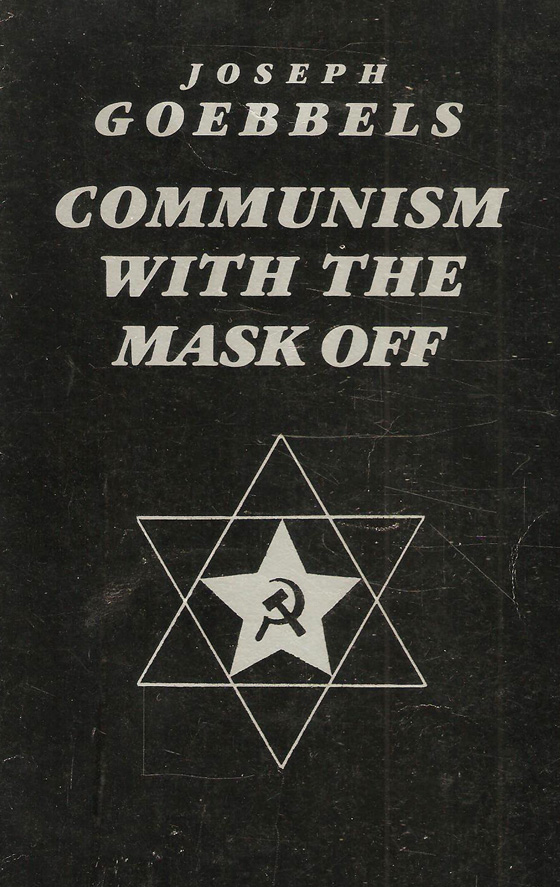
[Above: Communism with the Mask Off was a speech given by Joseph Goebbels in Nürnberg on September 13th, 1935 at the Seventh National Socialist Party Congress. It was later transcribed into a booklet.]
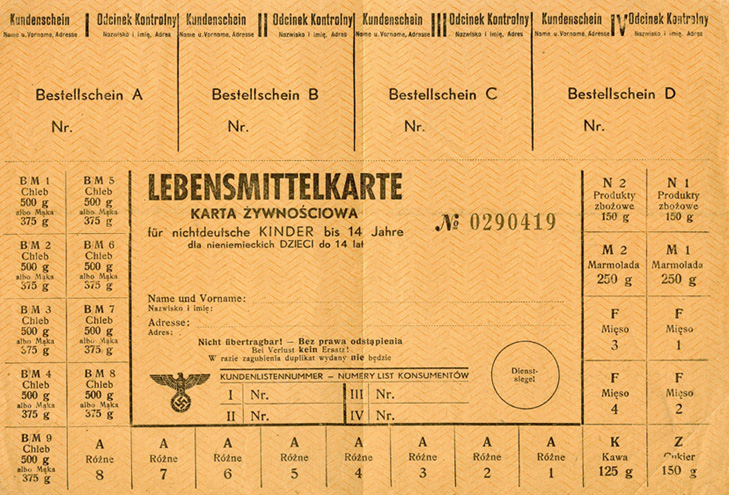
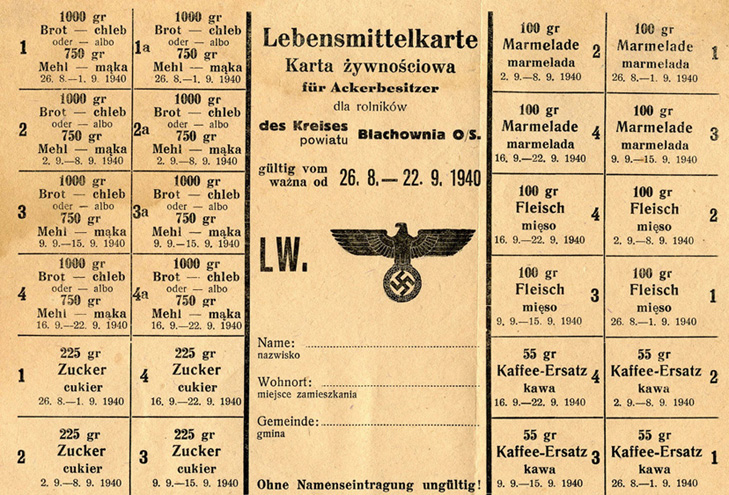
[Above (left): Ration certificate issued by the General Government (Poland), it says 'Lebensmittelkarte für nichtdeutsche KINDER bis 14 Jahre' (Food card for non-German CHILDREN up to 14 years).
It has various stamps for bread & flour, miscellaneous, coffee, sugar, meat, marmalade, grain products.
On the right is another ration certificate issued by the General Government (Poland), it says 'Lebensmittelkarte für Ackerbesitzer des Kreises Blachownia' (Food card for landowners in the Blachownia district). It was good until September 1940.
Blachownia is in Southern Poland and is a tiny town of under 10,000 people (currently). This certificate has coupons for bread & flour, sugar, miscellaneous, marmalade, meat and coffee substitute. Click to enlarge.]
Can I ask you this: if Hitler was so good why did so many people in Germany, like the royal families for example, oppose him and his ideas? This always confuses me.
Otto: Of course I can answer that, as I was once one of them. I studied a lot about the royal houses of Europe, and I wish to start here first. Why did some royals oppose Hitler and his ideas? As Hitler said in Mein Kampf, they were too enthralled with their lavish lifestyles, which were an affront to the hard-working citizens.
I could see back then that the royal houses were out of touch with the people and had a 'let them eat cake' mentality. I believe the people were tired of this, and the wars they started. The Bolsheviks shot them all, but Hitler just wanted them to be of no political importance, unless they were willing to work with him. Some could see the benefits of his ideals, others fought against him.
We know now a few were even allowed in the secret services and aided the enemy, costing us the war, they were later killed for their treason after being found out in 1944. They could not see far enough into the future to see their blood, which they claimed to respect and love, was in danger of being eradicated by ideas created by a masked enemy.
They took full partnership in this and even to this day, are used as examples of love and unity by the press, who delight in showing their scandals and race-mixing. They love nothing more than to show a royal being with a dark-skinned person and putting photos in the papers to encourage more of it.
They have become a mockery of Europe and they do not defend their or their people's blood and culture, which they claim to honor and respect. You see them clamoring in the media to save the starving African, or the whales, or this bird, but they will freely eradicate their bloodline, which is supposed to be holy.
I recently saw one decrying South Africa, which knows the meaning of preserving your blood and culture. They were for giving all power to the very people who have announced they would want to remove all whites and kill them if they refuse. These people are proving why Hitler wanted nothing to do with giving them power again.
Now some did work with him, and have my respect, but they seem to be in the minority. Most of their kind opposed him and to this day lay scorn on him and blame him for Germany's plight.
They fail to see that it was their fathers who laid the seed of Europe's plight with all the wars over borders, royal houses, and faiths. These wars led up to the first war, which in turn led to the second, where Hitler tried to right the wrongs of the first. He was not perfect by far, but the man earned my respect late, and I am glad I fought for his worldview.
Ok, so can I ask about the opposition to him by Germans, like how after the war they praised the Allies, even veterans, and the assassination attempts?
Otto: Well, some agreed with the Allies and openly had disdain for what they fought for, I do know of this. Some being wounded or suffering loss would be the trigger the Allies looked for to exploit. People are weak and if pressured or threatened sometime cave to whatever the stronger wants them to cave to, they will agree with anything and accept anything.
To understand the attempts, you must understand the context to which these happened. The two we all know of and agree with are the Bürgerbräukeller and July 20th [assassination attempts on Adolf Hitler]. One was an anarchist and Marxist sympathizer; the other was in a clique with the royals I just spoke of. They had a vast network that by 1944 figured the time had come to act.
I know the press likes to show these as brave men standing up to evil and acting, but they were cowards. Both men killed many innocents, this was nothing more than terrorism. Like the PLO planting a bomb to make a point that we should not support Israel.
I have a feeling that the British were behind both these acts, it just has not come out yet. They were not an example of honorable men rising to stop an evil tyrant. They were driven by an agenda that was managed by a foreign nation who was waging war on their homeland. They were convinced that their act would make them famous in a world that left them behind.
As for Germans agreeing with the Allies, well, I think it is just something that happens. In Poland and Russia when we arrived there were countless civilians who were eager to meet and work with us. In the police office we had many workers who helped with translating, investigations, and other tasks.
We did want to help the east recover from war, and the people were willing to help us. In Germany I think the Allies put fear into the people and came as victors after unleashing terror on the people. I think many people were quite afraid of them and did whatever they needed to do to survive. If that meant agreeing that it was wrong to support Hitler, then they told the victors what they wanted to hear.
I know some soldiers, mostly from the Waffen-SS, were beaten and coerced into admitting to battlefield crimes. The amount of law breaking and lack of jurisprudence the Allies did in these trials is staggering to me.
When you win a war, I suppose you have that right to do these things. I hope that explains to you why some Germans have sided with the Allies and their claims. In summary, the war was long and costly, some just had no more cares to give about politics and just wanted peace, no matter who gave it to them.
Many people wanted the Allies to think they had nothing to do with Hitler, they threw away their [NSDAP party] pins and burned their documents. They would say they opposed Hitler to make themselves look better. A Brit I spoke to right after told me it's amazing that he has not met a German who supported Hitler. He was being sarcastic but also making a point that Germans were lying. They were wearing a mask.
Something effective the Allies did was take control of children; they went to work molding their minds early on. This is a very old form of warfare where you control the future by controlling the children's education. That way you can raise them up to be obedient to your will. I see this in action today.
I understand you served on the Russian Front as a police soldier. What did you do?
Otto: Yes, that is right. I was sent to the east in 1942 to help organize and train police auxiliary forces. My experience by now was vast and I was called upon to take on more responsibility. Order had to be restored when the Soviets were pushed out and the army moved in. My first taste of Russia was in the spring of 1942, it was rainy and turned the roads into a glue.
I was sent to Minsk, then on to Sevastopol to set up police offices and to train and organize their security police forces. They had many who came to volunteer for this work. We even used women here to help with order, my comrade found him a girlfriend here who had a fisherman father, so we always had good fish.
This area was very quiet I remember, by 1943 the beaches were full of people going out, and it was like no war was there. I was moved that summer up into the Minsk region, where there was now partisan activity. I went from a peaceful existence to the hell of the north.
The partisan problem required a special training course to fight their tactics. Most of the bands had been organized by red army officers who went behind the lines and sought out groups of both unsurrendered soldiers, organized criminals, and those who were anarchists.
They started out small and disorganized, downing telephone lines, mining roads and bridges, derailing trains, and later killing collaborators. They went after groups of militias we trained early on; they even killed their families when they found them. I still cannot understand why they fought the way they did. It was as if they were the worst form of humans. They delighted in killing anyone who was on our side, some we found in the most bestial state.
These bands always had former criminals in them, people who were adept to theft, forgery, murder, kidnapping and breaking into buildings. The Soviets used this to their advantage as they formed these bands. In a few areas they even had rackets where they would kidnap children and then ask for ransoms. As I understand it, the Soviets had to deal with this after the war. They were criminals and will never stop being criminals until properly punished.
Here is where I will tell you many of us had moral dilemmas. On the one hand you had a human being who was given life but had chosen to use that life to be very evil. Today they have ignorant men defending them as heroes. They like to portray themselves as innocent victims who fought against us because we threatened them. When caught, if we did not harshly deal with them, they would continue to spread their propaganda that we were killing everyone. This inflamed those who were not around us. So, we would lose no matter what we did, but to exact retribution for their crimes made the victims feel better. So, we did.
You see the dilemma, to kill them was not always fair, but they killed innocents by their illegal actions in a time of war. Harsh laws were in place to try to prevent these things, and to do nothing only invited more of this. When I read these stories of reprisals in the east, they never seem to care or divulge that the partisans caused deaths in these actions.
They seem to be praising them as heroes and martyrs, which in my eyes were more cowards and criminals.
My police battalion was active in 1944 in the north, and we saw the aftermath of their 'heroic actions'. They grew in strength as the Soviets asked for volunteers to go help them. We caught Spanish, Czech, French, Polish, and even a German scoundrel. They were all not from the areas we caught them in, all were guided in by red officers. Because they were not from the areas they operated in, they either made friends or enemies.
If they made enemies, a small civil war would break out between the militias and partisan bands. This was rare of course as these bands were usually quite small, and the civilians would come and turn them in very easily. It was not until late 1944 that we lost the ability to really fight them.
I saw the east front collapse in 1944 and we were put into a full combat role, being caught behind the main battle lines a few times. One time I will tell you I saw something that made me furious with rage and showed me who we are fighting. I do not know if it was partisans or Soviet soldiers.
There was a German military cemetery outside this town where the men fell in 1941-42. We were caught behind the lines and as we moved back, we came across this place. It had been torn down to shreds, the crosses were broken and ran over, it certainly was done on purpose. A monument was run over, perhaps by tanks, which was where most damage came from, but all the markers were pulled up and burned or broken.
I understand we were the invader and seen as the enemy. However, you always show the dead some sort of respect. Even when we came across fallen partisans or Soviet soldiers we allowed or gave them a respectable burial if we could.
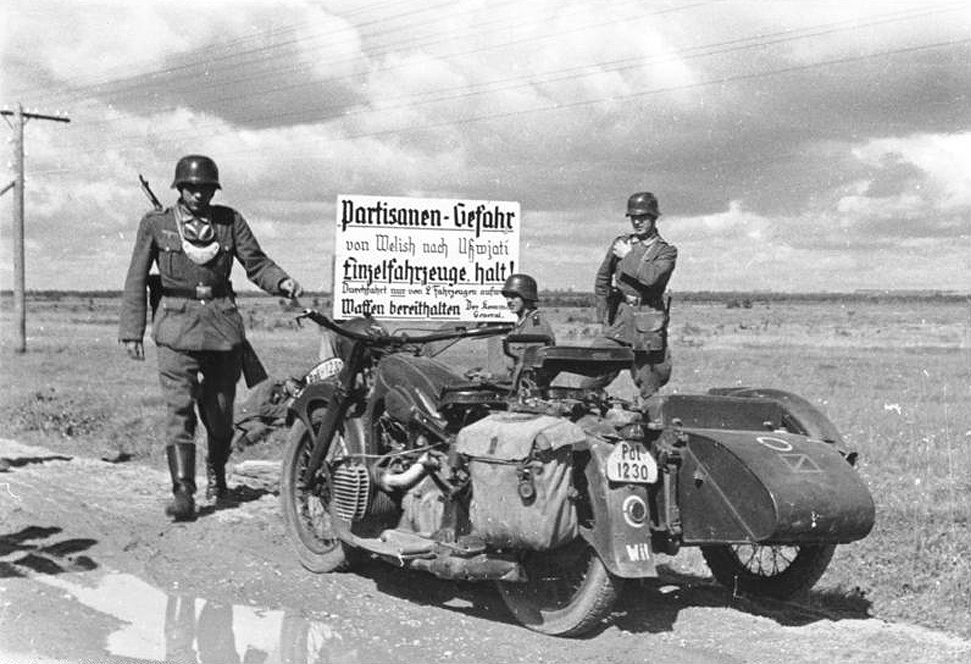
[Above: Feldgendarmerie (field police) operating in occupied Russia, July 1941. The sign says 'Partisanen-Gefahr von Welish nach Ußwjati. Einzelfahrzeuge halt! Waffen bereithalten' (Partisan danger from Velizh to Usvyaty. Single vehicles Stop! Weapons at the ready).]
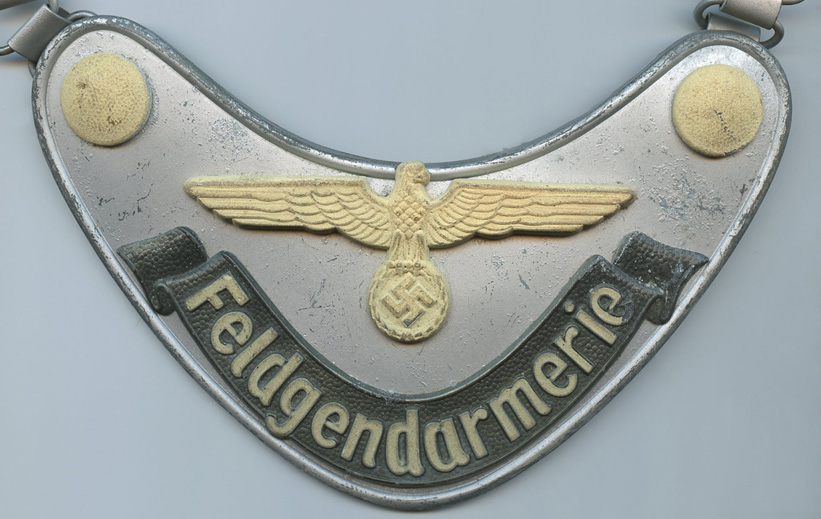
[Above: The Feldgendarmerie gorget you can see the men above and below wearing. The Third Reich produced a wide variety of beautiful gorgets. This example actually glows in the dark, painted with phosphorescent paint. Gorgets were originally worn by knights and were a part of their armor. Click to see more.]
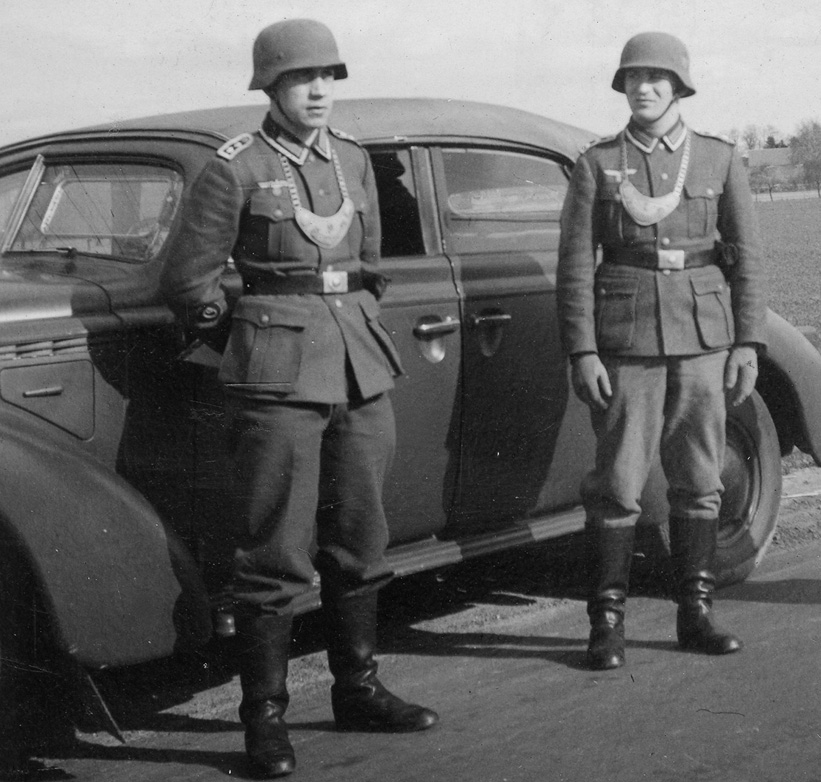
[Above: Feldgendarmerie men sometime in 1943. Click to see full picture.]
I am curious, how were enemy dead handled by German units?
Otto: After a battle, or if we came across dead, usually we would engage a local to help us round them up and bury them. At times we had to leave it to the locals to take care of as we had to move fast. If we were behind the lines and at rest, we would often be called upon by the Spieß [Hauptfeldwebel, German military slang name for the Company sergeant major in the German Wehrmacht] to help.
Soviet soldiers never had any identity tags I remember so we would often mark a Soviet soldier's grave as just a soldier. For the partisans we would bury them and ask God to have pity on them, but they were usually never marked unless the locals knew who it was.
How did the war end for you?
Otto: I was one of the lucky ones as I made it through the combat in the east. I was wounded a couple of times but nothing severe enough to put me in a lengthy hospital stay. We retreated through Poland and tried to avoid encirclement and capture. Close to the end, we were instructed that the Soviets were executing any police units as they accused us of unlawful killings and crimes against the Soviet people. We were told to remove all police identification. We were given army uniforms by our commander and told we were moving west to surrender to the British.
This was in April, by now all the fight was gone, it was only a survival mode that drove us. We had to help the masses of civilians who were trying to avoid the cities and move west. It was a time most of us have tried to remove from our memories as it was a time of unending suffering.
Some days we had no food to speak of and were lucky if we came to a spring for water. We somehow were able to avoid the Soviets, and by May we made it to the British. By now it was all over and although we had to endure the rough treatment and insults of our captors, we were happy to have survived when so many did not in those last months.
We were put into camps and held for a few months; they surprisingly were glad when they found out I was a former police man.
I was pulled out of the camp and sent to training to aid the occupation forces restore order and help the masses of refugees. This was in August or September I believe. I was able to then start fresh with life and return home soon after. But what an adventure that I wish I never had had. War is not the answer to any nation's problems, yet we never learn that.
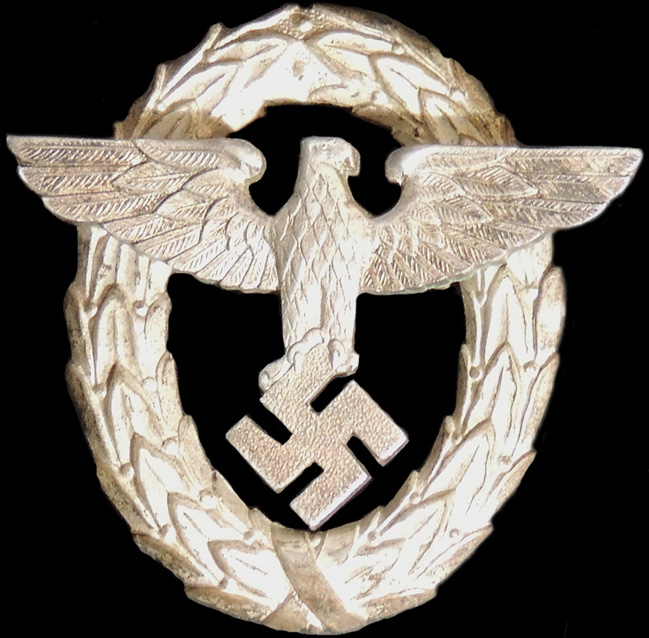
[Above: First pattern police cap eagle.]

Back to Interviews















